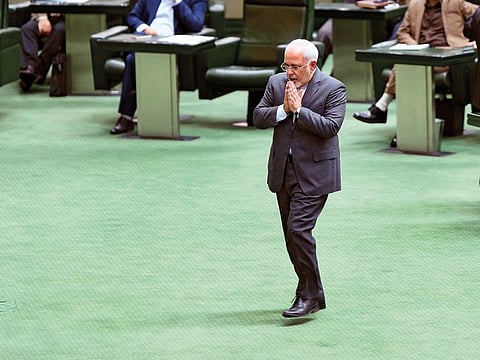Pressure from anti-western hardliners made Zarif quit
150 lawmakers petition Rouhani not to accept foreign minister’s resignation

Dubai: In a surprise move, Iran’s foreign minister Mohammad Javad Zarif announced his resignation on Monday evening on his Instagram account, a move many analysts believe is the result of pressure he faced from hardliners for favouring diplomacy with the West.
His resignation has led to public outcry and disappointment in the Islamic republic, according to Trita Parsi, the founder and current president of the National Iranian American Council.
Parsi told Gulf News in an interview that nearly 150 lawmakers have petitioned Iranian President Hassan Rouhani not to accept Zarif’s resignation letter.
“It is very clear that this move reveals how much support Zarif has and how little support the hardliners have in attacking him [Zarif] for such a long time,” Parsi said.
It is an angry letter of resignation [submitted] through social media, rather than submitting an official letter of resignation to the Iranian president.Ahmad Kamel Al Buheiri, Iranian affairs expert at the Cairo-based Al Ahram Strategic Studies Centre
US-educated Zarif is seen as the architect of the Joint Comprehensive Plan of Action (JCPOA), the nuclear deal struck in 2015 that curbed Iran’s nuclear programme in exchange for sanctions relief. However, US President Donald Trump’s move to withdraw America from the deal last gave hardliners plenty of ammunition as they criticised the policies of both Rouhani and Zarif.
“I am not saying it was his intention [to resign], but announcing it through social media was a way for him to reach [and inform] the public [of] his decision,” Parsi said.
According to Ahmad Kamel Al Buheiri, an Iranian affairs expert at the Cairo-based Al Ahram Strategic Studies Centre, the manner in which the resignation was announced shows it came as a “reaction”.
“It is an angry letter of resignation [submitted] through social media, rather than submitting an official letter of resignation to the Iranian president,” Al Buheiri told Gulf News.
Zarif gave no reason for his decision to quit, which coincided with Syrian President Bashar Al Assad’s first visit to Tehran since the start of the Syrian war. Al Assad met Supreme Leader Ayatollah Ali Khamenei, and Rouhani. Zarif, however, was nowhere to be seen on both occasions.
While some press reports speculated that Zarif had resigned in protest after not being informed of Al Assad’s visit. analysts said the visit was only one element of the growing pressure he has faced from hardliners of late in connection with the nuclear deal and what comes next.
“It was going to happen sooner or later,” said Al Buheiri.
Zarif was praised by the media for putting up a “striking performance” after he criticised Trump’s foreign policy at the annual Munich Security Conference this month and demanded that the European Union do more to protect the nuclear deal.
“Zarif’s performance in Munich made him very popular in Iran, even hardliners had to acknowledge his successes,” Parsi said. “It put him in a strong position.”
Iran’s stock market felt the impact of Zarif’s resignation as stocks tumbled.
The Iran experts, however, believe Rouhani will accept the resignation.
“I even expect President Rouhani to convince Zarif to withdraw his resignation. Otherwise, another figure will be chosen and that choice will lead to more divisions and power struggles in Iran,” said Al Buheiri. “The hardliners will try to impose their own choice [on] the foreign ministry, and this will further complicate things for the president.”
Parsi said the aftermath of Zarif’s resignation will be an important pointer as to how things will move in the Islamic republic.
“If he [Zarif] stays, he will be, I suspect, in a stronger position than he was before,” Parsi said. “If he goes, depending on [who] is replacing him, it will most likely indicate a very important shift in Iran because it will be the defeat of the most prominent diplomat who has favoured engagement and diplomacy with the West.”
And if Zarif is replaced by a hardliner, “then it would be a very much a return to the approach of [the hardline former Iranian President Mahmoud] Ahmadinejad”, said Parsi.



